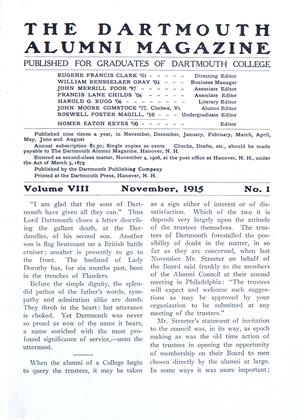The editor of the ALUMNI MAGAZINE has received the following communication from Dr. Tucker. The pride as well as the sympathy of all Dartmouth men will be aroused by this record of sacrifice. In sending the message from Lord Dartmouth, Dr. Tucker writes:
I am sure that the "Dartmouth friends" to whom Lord Dartmouth refers so feelingly in the letter which I enclose for publication in the ALUMNI MAGAZINE, will be moved with sympathy and admiration as they read the details of the death of Captain Legge, the second son of the family.
I did not know him personally, but President Nichols who met him in the home was very much impressed with his kindliness and with his rare intelligence. He was a naturalist, and had made important contributions to the British Museum as the result of explorations in Africa. I think that he must have been about thirty years of age.
It gives us a very real sense of the tremendous sacrifice of the family life of England as we read the closing words of Lord Dartmouth's letter, so brave, but so pathetic: "I am glad to think that the sons of Dartmouth have given all they can."
Lord Dartmouth's letter follows:
October 7th, 1915
DEAR MR. TUCKER:
My second son has been killed in the Dardanelles. We heard on August 21st from the War Office that he was reported missing between the 7th and 11th of August and after ten days of acute anxiety I got a letter from the General of his Division telling us he had been killed at Suvla Bay on the 9th.
I am sure my Dartmouth friends will sympathize with us in our loss. It has been a heavy blow to us all, especially to his mother and sister, but we have much to console us. It is the first break in a very happy home circle and leaves a gap that will never be filled, but we had no differences while he was alive, and we have nothing but pleasant memories now that he has gone.
His men loved him and he loved his men. We hear from the men and officers of his Regiment who have come back, wounded, how splendid an example he set of courage and self devotion to duty. He was wounded in the shoulder early in the day, and while his servant (a man so devoted to him that he told his brother before he sailed "if anything happens to my officer and he goes under, you need not expect to see me again") was bandaging his wounds he was again badly wounded in the thigh. The stretcher bearers were ready to take him back to the base but he refused to leave his post, and the last seen of him was when mortally wounded he was still cheering on his men. He and his servant were killed side by side. His body has never been recovered. After all, a life made worth living, followed by a splendid death, does not leave much room for regret, however sore the heart may be.
Lewisham leaves for one or other of the theatres of war any day now. My third son is Flag Lieutenant on one of our finest battle cruisers, so his chance may come any day, and Lady Dorothy's husband has been in the trenches in Flanders for the past six months. lam glad to think that the sons of Dartmouth have given all they can.
With kind regards, Yours sincerely, DARTMOUTH
 View Full Issue
View Full Issue
More From This Issue
-
 Article
ArticleTHE OCTOBER MEETING OF THE TRUSTEES
November 1915 -
 Article
Article"I am glad that the sons of Dartmouth
November 1915 -
 Article
ArticleTOWARD A NEW LIBRARY BUILDING
November 1915 By Nathaniel L. Goodrich -
 Class Notes
Class NotesCLASS OF 1885
November 1915 By EDWIN A. BAILEY -
 Article
ArticleADDRESS DELIVERED AT THE OPENING OF COLLEGE SEPTEMBER 23, 1915
November 1915 By Ernest Fox Nichols -
 Class Notes
Class NotesLOCAL ASSOCIATIONS
November 1915








